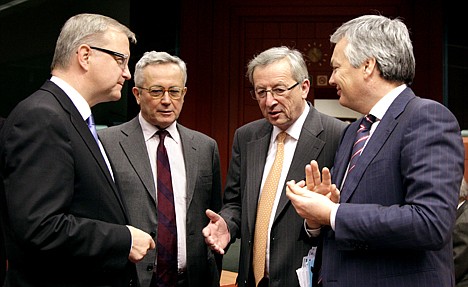Eurozone says bailout funds enough ... for now
BRUSSELS - Top European officials insisted Monday that they have enough financial firepower right now to deal with Europe's government debt crisis - but did not rule out increasing Europe's bailout fund in the future.
Jean-Claude Juncker, who chaired a meeting of the eurozone's 16 finance ministers, said that there wasn't any immediate need to increase the 750 ($1 trillion) financial backstop despite concerns that it just isn't enough. The fund is for eurozone governments in danger of running out of money.
"For the time being, there's no need to increase," Juncker said after the meeting.
The big fear in the markets is that Portugal, and even more dangerously, much bigger Spain, will join Greece and Ireland in needing a financial lifeline - and that Europe might not have enough bailout money available to cope and keep countries that run into financial trouble from defaulting on their debts.
In May, eurozone governments and the International Monetary Fund set up the 750 billion financial backstop for the currency bloc. The majority is managed by the so-called European Financial Stability Facility, which can issue up to 440 billion in bonds guaranteed by eurozone governments. The EU's executive Commission can lend an additional 60 billion, while the IMF has said it would contribute up to 250 billion.
The idea behind the facility was to reassure bond markets that countries would be able to pay - and halt the selloff of government bonds.
Klaus Regling, who heads the EFSF said that Ireland's 67.5 billion bailout agreed last month will use up less than 10 percent of the total backstop.
"There are sufficient resources left to deal with other relevant cases," Regling said.
Regling said funding was not proving to be an issue and said he was getting interest in the facility's future bond issues from all around the world and from all types of investors, including central banks, sovereign wealth funds and rich individuals.
The finance ministers were under somewhat less pressure than at recent gatherings after the European Central Bank stepped up purchases of government bonds in an attempt to restore confidence in the EU's single currency bloc - figures showed that it splashed out 1.965 billion buying government bonds in the week leading up to Tuesday. That was up from 1.345 billion the week before and the highest weekly amount in months.
But heavy debts and doubtful growth prospects mean the crisis remains. Next week's figures will be key as they will contain purchases by the bank last Friday, Dec. 2, when it held its monthly policy meeting.
Market participants suspect the stabilization in European bond markets since the meeting has been largely thanks to even more purchases by the central bank, under pressure from policymakers to do more to prevent Europe's debt crisis from spreading - buying bonds supports their prices, taking pressure off the banks that hold them. It also lowers bond yields, which indicate the borrowing costs countries would face were they to go into the market for more credit.
The seeming stabilization in the bond markets may be one reason why a proposal earlier in the day from Juncker and Italy's Finance Minister Giulio Tremonti for the creation of pan-European bonds to support governments with shaky finances failed to get a hearing.
That proposal was not discussed, according to Juncker, after Germany, the Netherlands and Austria quickly came out against the idea.
The three countries, because of their lower debt levels and more competitive economies, pay much lower interest rates on their bonds than weaker eurozone nations like Ireland, Portugal or Italy. The interest rate on pan-European bonds would likely be higher than what they are paying at the moment, because it would price in the risk of default of poorer governments.
The most vociferous opposition came from Germany, Europe's biggest economy.
Chancellor Angela Merkel said such bonds were legally impossible under the current EU treaties.
"It is our firm conviction that the treaties do not allow joint eurobonds, that is no universal interest rate for all European member states," she said in Berlin.
Juncker tried to put a brave face on the rejection, dismissing the idea that the proposal has been strangled at birth.
He noted that a proposal he made in 2005 about an annual review of EU member states' budgets was not taken seriously at the time either. However in October, European finance ministers agreed to introduce the so-called European semester, which checks whether governments are sticking to the EU's deficit limits.
Juncker said he hoped the "same fate is reserved for the eurobonds."
Juncker's proposal was not dismissed out of hand by Olli Rehn, the EU's monetary affairs commissioner, who said he found the idea "intellectually attractive."
The finance ministers failed to make a decision on how to fund a new crisis tool that is supposed to support countries that run into financial trouble after 2013, when the current fund's mandate expires. Further discussions could take place Tuesday when the eurogroup ministers are joined by their counterparts in the wider 27-country EU.
Crucially, this so-called European Stability Mechanism will force private creditors to share the pain if a nation is deemed insolvent - that is, if its debts are too big to repay. However, if a government merely faces a liquidity crisis - it can't access funds fast enough to meet payment deadlines - it is supposed to get rescue loans from the new mechanism.
The ministers agreed on the broad outlines of the new mechanism late last month, but didn't say where the money for the emergency loans would come from.
The threat of potential losses for private bondholders like banks and hedge funds, which were spared in this year's bailouts, has spooked government debt markets in recent weeks and reopened debate on whether the existing bailout fund will be big enough in case large economies like Spain or Italy run out of money.

